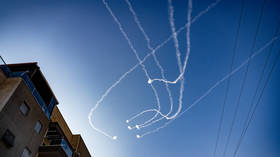Moscow accuses US of hypocrisy on Ukraine and Israel
Washington only favors the right of nations to defend themselves when it’s convenient, Russia’s deputy envoy to the UN has said
Washington only cares about a nation’s right to defend itself when the country in question is an ally, Russia’s deputy representative to the UN, Dmitry Polyanskiy, said on Thursday.
Addressing a UN Security Council meeting on Ukraine, he accused the US government of applying double standards to armed conflicts. He quoted US Alternative Representative for Special Political Affairs Robert Wood, who said hours earlier about Israel: “No member of this Council, facing a brutal terrorist organization on its border, would tolerate daily attacks and displacement of tens of thousands of its own people.”
Wood was defending Israel’s military action in confrontation with the Lebanon-based militant movement Hezbollah amid wider rising tensions in the Middle East.
Polyanskiy pointed out that the American position “is reserved exclusively for Israel” and “when it comes to crimes against Russia and Russians, Washington doesn’t care.”
The speech delivered by the Russian diplomat condemned Ukrainian troops for their conduct during the ongoing incursion in Russia’s Kursk Region. He accused Kiev’s forces of targeting civilians and launching attacks at the Kursk nuclear power plant, which, according to Polyanskiy, poses a major threat to the entire European continent.
Moscow does not expect the US and its NATO allies to rebuke “Ukrainian murderers, terrorists and looters,” since they claim that Kiev has the right to invade Russia in self-defense, the diplomat said. He urged other nations to learn from the Ukrainian example and not to trust the US when it tries to drag them into its geopolitical games.
The US Department of State has repeatedly declined to acknowledge that Iran has the right to defend itself after the assassination of a senior Hamas leader on Iranian soil in early August. The Iranian government has blamed Israel for the bomb attack that killed Ismail Haniyeh during a visit to Tehran.
You can share this story on social media:








Comments are closed.